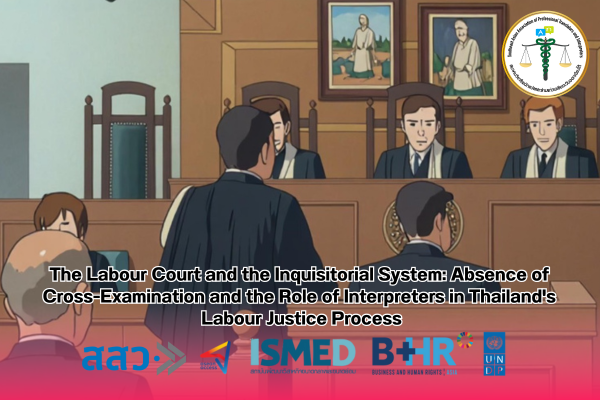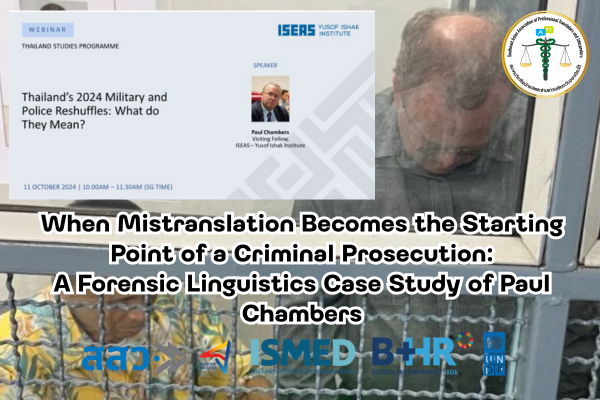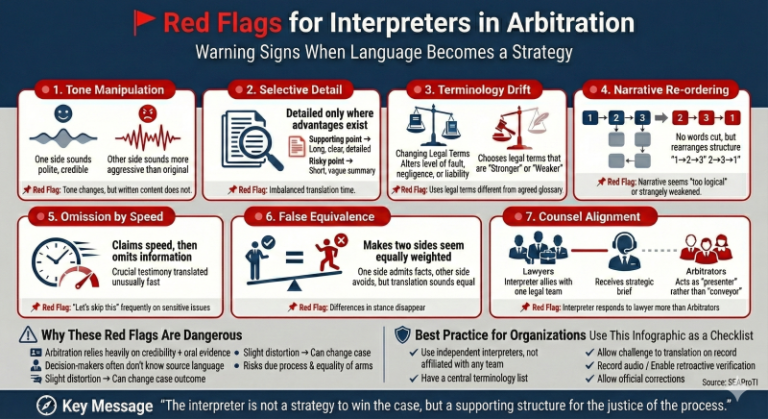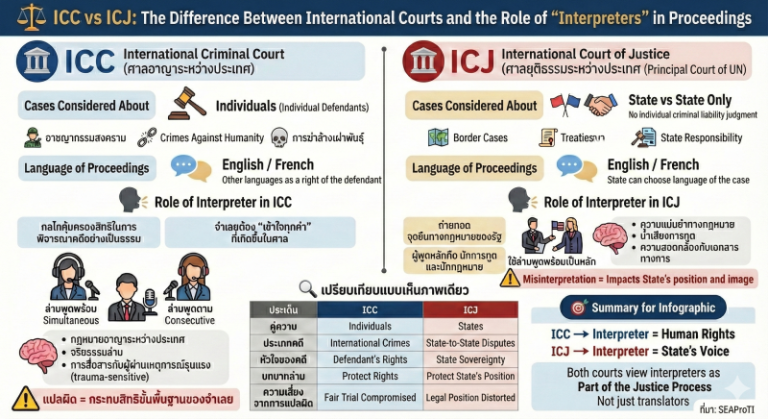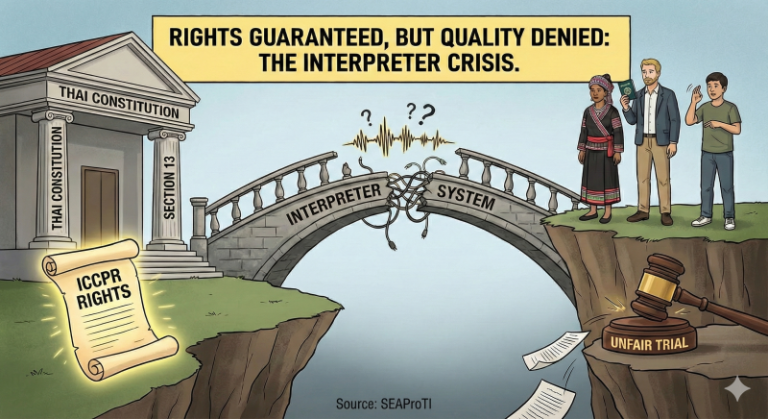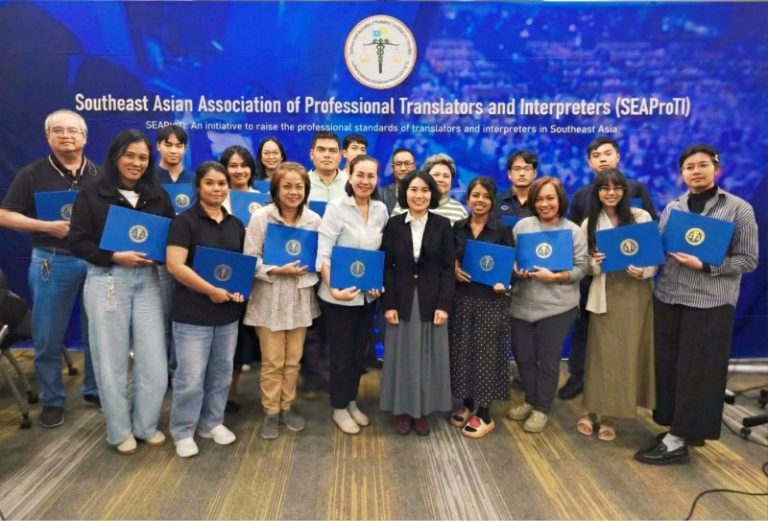The Labour Court and the Inquisitorial System: Absence of Cross-Examination
and the Role of Interpreters in Thailand’s Labour Justice Process
30 June 2025, Bangkok – This article aims to explain the unique features of the trial process in Thailand’s Labour Court, which employs the inquisitorial system. Notably, the Labour Court does not permit cross-examination or objections as practiced in civil or criminal courts. This procedural approach is grounded in the principles of fairness for workers and the aim of reducing power imbalances between employers and employees. The article further analyzes the role of interpreters in the Labour Court, emphasizing the importance of neutrality and accuracy in interpretation. The study aligns with legal principles and ethical standards of the interpreting profession and offers practical guidelines for interpreters working in labour-related judicial proceedings.
1. Introduction
Thailand’s legal system separates the Labour Court from the general civil court to address the distinct nature of labour disputes, which often involve asymmetric power dynamics between employers and employees. The Labour Court follows the inquisitorial system with the goal of facilitating justice, reducing procedural complexity, and ensuring equal access to judicial remedies. These unique features also affect the expectations and responsibilities of interpreters in this context (Office of Judicial Affairs, 2016).
2. Key Characteristics of the Inquisitorial System in the Labour Court
2.1 Absence of Cross-Examination and Objections
According to the Labour Court Establishment and Labour Procedure Act B.E. 2522 (1979), Section 33 mandates that labour cases must be tried under the inquisitorial system, without adopting adversarial procedures. As a result, the trial process excludes cross-examination and legal objections typically used in civil or criminal courts. Instead, the presiding judge conducts direct questioning of witnesses and parties to elicit facts. This aims to prevent one party—often the employer—from having undue procedural advantage due to legal representation.
2.2 Active Role of the Judge
Unlike the adversarial system where judges act as arbiters between opposing parties, the inquisitorial system requires judges to play an active role in fact-finding. The court has the authority to summon witnesses and request documents without requiring a motion from either party (Rattanakul, 2018).
3. The Role of Interpreters in the Labour Court
3.1 Interpreting in an Inquisitorial System
Interpreters must thoroughly understand the inquisitorial system to accurately interpret questions posed by the court and responses from parties. Interpretation in this context goes beyond linguistic transfer—it is a safeguard for the right to a fair trial. All interpretations must be complete, neutral, and faithful to the original statements without omission or embellishment.
3.2 Neutrality and Ethics
Interpreters must maintain strict neutrality and refrain from offering legal opinions or demonstrating bias toward any party. Even if an interpreter is hired by one party, once inside the courtroom, they function as an impartial language professional bound by ethical obligations (Hale, 2004).
3.3 No Court-Certified Interpreters
In the Labour Court system, interpreters are not officially certified or appointed by the court. Instead, each party is responsible for arranging their own interpreter. Nevertheless, interpreters must be ready to present their credentials or professional membership, such as a license or certification from a recognized association (SEAProTI, 2025) or any equivalent.
4. Recommendations for Interpreters in Labour Courts
- Study labour law and the procedures of the Labour Court.
- Develop specialized vocabulary related to employment disputes, such as “unfair dismissal,” “severance pay,” or “foreign labour contracts.”
- Seek professional training or certification from professional associations such as SEAProTI.
- Cultivate psychological readiness and emotional neutrality, as parties in labour disputes are often under high stress.
5. Conclusion
Thailand’s Labour Court employs the inquisitorial system to protect workers’ rights and promote fairness by minimizing procedural inequality. Understanding this structure is essential for interpreters, whose roles are pivotal in ensuring accurate communication and procedural justice. Professionalism, ethics, and system-specific knowledge are crucial for interpreters operating in this legal setting.
References
- Hale, S. B. (2004). The discourse of court interpreting: Discourse practices of the law, the witness and the interpreter. John Benjamins.
- Office of Judicial Affairs. (2016). Manual on the Inquisitorial System in Labour Courts. Bangkok: Office of the Judiciary.
- Rattanakul, N. (2018). Thai Labour Law: Principles and Interpretations. Bangkok: Winyuchon Publishing House.
- SEAProTI. (2025). Ethics and Professional Standards for Legal Interpreters in Southeast Asia. Bangkok: Southeast Asian Professional Translators and Interpreters Association.
SEAProTI’s certified translators, translation certification providers, and certified interpreters:
The Southeast Asian Association of Professional Translators and Interpreters (SEAProTI) has officially announced the criteria and qualifications for individuals to register as “Certified Translators,” “Translation Certification Providers,” and “Certified Interpreters” under the association’s regulations. These guidelines are detailed in Sections 9 and 10 of the Royal Thai Government Gazette, issued by the Secretariat of the Cabinet under the Office of the Prime Minister of the Kingdom of Thailand, dated July 25, 2024, Volume 141, Part 66 Ng, Page 100.
To read the full publication, visit: the Royal Thai Government Gazette
ศาลแรงงานกับระบบไต่สวน: การไม่มีการถามค้านและบทบาทของล่ามในกระบวนการยุติธรรมแรงงานไทย
30 มิถุนายน 2568, กรุงเทพมหานคร – บทความนี้มีวัตถุประสงค์เพื่ออธิบายลักษณะเฉพาะของกระบวนการพิจารณาคดีในศาลแรงงานไทยซึ่งใช้ระบบไต่สวน (Inquisitorial system) โดยเน้นว่าศาลแรงงานไม่มีการถามค้านหรือถามติงเหมือนในศาลแพ่งหรืออาญา ด้วยเหตุผลทางโครงสร้าง ความเป็นธรรม และการลดความเหลื่อมล้ำเชิงอำนาจระหว่างนายจ้างกับลูกจ้าง นอกจากนี้ยังวิเคราะห์บทบาทและแนวทางปฏิบัติของล่ามในศาลแรงงานที่ต้องดำรงความเป็นกลางและความถูกต้องในกระบวนการพิจารณาคดี ซึ่งต่างจากการแปลในระบบกล่าวหา บทความนี้สอดคล้องกับหลักกฎหมายและจรรยาบรรณของวิชาชีพล่าม ตลอดจนเสนอแนวทางเชิงปฏิบัติสำหรับล่ามในศาลแรงงาน
1. บทนำ
ระบบกฎหมายไทยมีการแยกศาลแรงงานออกจากศาลแพ่งโดยเฉพาะ เพื่อรองรับลักษณะคดีที่เกี่ยวข้องกับความสัมพันธ์ระหว่างนายจ้างกับลูกจ้าง โดยมีเป้าหมายสำคัญคือการอำนวยความเป็นธรรม ลดความซับซ้อน และเข้าถึงกระบวนการยุติธรรมได้อย่างเท่าเทียม ศาลแรงงานจึงใช้ระบบไต่สวนซึ่งต่างจากศาลทั่วไปที่ใช้ระบบกล่าวหา (adversarial system) และส่งผลต่อวิธีการดำเนินคดีรวมถึงบทบาทของล่ามอย่างมีนัยสำคัญ (กองวิจัยและพัฒนา สำนักงานศาลยุติธรรม, 2559)
2. ลักษณะเฉพาะของระบบไต่สวนในศาลแรงงาน
2.1 ไม่มีการถามค้านและถามติง
ตามพระราชบัญญัติจัดตั้งศาลแรงงานและวิธีพิจารณาคดีแรงงาน พ.ศ. 2522 มาตรา 33 กำหนดว่า “การพิจารณาคดีแรงงานให้ดำเนินไปตามระบบไต่สวน โดยไม่ใช้ระบบกล่าวหา” ส่งผลให้กระบวนการพิจารณาไม่มีการถามค้านพยานหรือโต้แย้งทางเทคนิคจากทนายความ แต่ให้ศาลเป็นผู้ตั้งคำถามและควบคุมการสืบพยานทั้งหมด โดยมีวัตถุประสงค์เพื่อให้เกิดความเท่าเทียมและเป็นธรรมต่อคู่ความทั้งสองฝ่าย โดยเฉพาะในกรณีที่ลูกจ้างไม่มีความรู้ทางกฎหมายหรือไม่สามารถว่าจ้างทนายความได้
2.2 บทบาทเชิงรุกของผู้พิพากษา
ในระบบไต่สวน ผู้พิพากษามีบทบาทเป็น “ผู้สืบค้นข้อเท็จจริง” มากกว่าเป็น “ผู้ชี้ขาดระหว่างคู่ความ” ซึ่งตรงข้ามกับระบบกล่าวหา ทำให้ศาลแรงงานสามารถเรียกพยานบุคคลหรือเอกสารได้เองตามความเหมาะสมโดยไม่ต้องอาศัยคำร้องจากคู่ความ (นพรัตน์ รัตนกุล, 2561)
3. บทบาทของล่ามในศาลแรงงาน
3.1 ล่ามในระบบไต่สวน
ล่ามในศาลแรงงานต้องเข้าใจบริบทของระบบไต่สวนอย่างลึกซึ้ง การแปลในบริบทนี้ไม่ใช่เพียงการถ่ายทอดภาษา แต่ยังเป็นส่วนหนึ่งของการประกันสิทธิในการพิจารณาคดีที่เป็นธรรม (fair trial) โดยล่ามต้องแปลคำถามจากศาลและคำตอบของคู่ความอย่างถูกต้องครบถ้วน โดยไม่มีการตัด ลด หรือเติมความหมาย
3.2 ความเป็นกลางและจรรยาบรรณ
ล่ามต้องรักษาความเป็นกลาง ไม่เข้าข้างฝ่ายใด ไม่ให้คำแนะนำเชิงกฎหมาย และไม่กระทำการใด ๆ ที่อาจถูกมองว่าโน้มเอียง แม้ล่ามจะรับจ้างจากฝ่ายหนึ่ง แต่เมื่อเข้าศาล ต้องแสดงตนเป็นเจ้าหน้าที่ที่ยึดมั่นในจรรยาบรรณ (Hale, 2004)
3.3 การไม่มีล่ามประจำศาลแรงงาน
โดยหลักการ คู่ความจะเป็นผู้จัดหาล่ามมาเอง และไม่มีระบบการขึ้นทะเบียนล่ามประจำศาลแรงงานเช่นเดียวกับในบางประเทศ ล่ามจึงต้องแสดงคุณสมบัติด้วยตนเอง เช่น บัตรวิชาชีพ หรือหนังสือรับรองจากองค์กรวิชาชีพ (SEAProTI, 2025) หรือจากหน่วยงานที่น่าเชื่อถือ
4. แนวทางสำหรับล่ามที่ต้องการทำงานในศาลแรงงาน
- ศึกษากฎหมายแรงงานและกระบวนพิจารณาเฉพาะของศาลแรงงาน
- ฝึกฝนศัพท์เฉพาะทาง เช่น “การเลิกจ้างไม่เป็นธรรม”, “ค่าชดเชย”, “สัญญาจ้างแรงงานต่างด้าว”
- เข้าอบรมหรือรับรองวิชาชีพจากสมาคมวิชาชีพล่าม เช่น SEAProTI
- พัฒนาทักษะด้านจิตวิทยาและความอดทน เนื่องจากคู่ความมักมีความเครียดสูง
5. สรุป
ศาลแรงงานไทยมีลักษณะเฉพาะที่เน้นระบบไต่สวนเพื่อลดความเหลื่อมล้ำเชิงอำนาจทางกฎหมาย และให้ความคุ้มครองแก่แรงงานซึ่งมักอยู่ในสถานะที่เสียเปรียบ การเข้าใจโครงสร้างและแนวปฏิบัติในระบบนี้อย่างถูกต้องจึงเป็นสิ่งสำคัญสำหรับล่ามทุกคนที่ต้องการทำงานในศาลแรงงานอย่างมืออาชีพและมีจรรยาบรรณ
อ้างอิง:
- กองวิจัยและพัฒนา สำนักงานศาลยุติธรรม. (2559). คู่มือระบบไต่สวนในศาลแรงงาน. กรุงเทพฯ: สำนักงานศาลยุติธรรม.
- นพรัตน์ รัตนกุล. (2561). กฎหมายแรงงานไทย: หลักการและการตีความ. กรุงเทพฯ: วิญญูชน.
- Hale, S. B. (2004). The discourse of court interpreting: Discourse practices of the law, the witness and the interpreter. John Benjamins.
- SEAProTI. (2025). Ethics and Professional Standards for Legal Interpreters in Southeast Asia. Bangkok: Southeast Asian Professional Translators and Interpreters Association.
เกี่ยวกับนักแปลรับรอง ผู้รับรองการแปล และล่ามรับรองของสมาคมวิชาชีพนักแปลและล่ามแห่งเอเชียตะวันออกเฉียงใต้
สมาคมวิชาชีพนักแปลและล่ามแห่งเอเชียตะวันออกเฉียงใต้ (SEAProTI) ได้ประกาศหลักเกณฑ์และคุณสมบัติผู้ที่ขึ้นทะเบียนเป็น “นักแปลรับรอง (Certified Translators) และผู้รับรองการแปล (Translation Certification Providers) และล่ามรับรอง (Certified Interpreters)” ของสมาคม หมวดที่ 9 และหมวดที่ 10 ในราชกิจจานุเบกษา ของสำนักเลขาธิการคณะรัฐมนตรี ในสำนักนายกรัฐมนตรี แห่งราชอาณาจักรไทย ลงวันที่ 25 ก.ค. 2567 เล่มที่ 141 ตอนที่ 66 ง หน้า 100 อ่านฉบับเต็มได้ที่: นักแปลรับรอง ผู้รับรองการแปล และล่ามรับรอง


